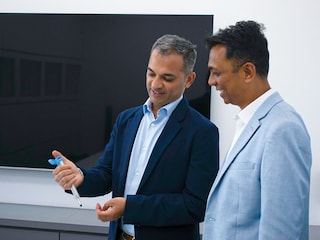IntegriMedical: Making needle-free injection accessible
Pune-based health care company IntegriMedical is rethinking drug delivery with its needle-free injection system


When Pune resident Mabel Kurian took her five-year-old daughter for vaccination recently, the doctor told her about needle-free injections. Like most children, the child was fearful of injections and when Kurian learnt of this option, she opted for it. “When it was being administered, I could see she was much calmer," says the 40-year-old mother, and a consultant by profession.
Launched in 2024 by Pune-based health care company IntegriMedical, India’s first Needle-Free Injection System (N-FIS) has been proven to be a nearly pain-free experience that can be used for various subcutaneous (applied under the skin) and intramuscular applications using low viscosity drugs. Low viscosity drugs are fluids that are thin and can flow easily.
The device, which is manufactured at the company’s global manufacturing assembly and distribution centre in Pune after being put together from components sourced from places like China and Europe, costs about ₹400-500 at the doctor.
“Our goal is to make it more and more accessible. We’ve kept the initial pricing for the entire kit fairly low so that doctors can adopt it and can get their value for money in a couple of months," says Sarvesh Mutha, MD and chief business officer of IntegriMedical. As the market penetration increases, the price would substantially go lower, he adds.
Initial research by the team at IntegriMedical, founded by Sarvesh Mutha, Ankur Naik, Scott McFarland and Mark Timm in 2020 showed that two out of three children, or one out of four adults have needle phobia due to which they sometimes even avoid vaccinations. “That was certainly a major reason for us to get into this space, so that we could reduce that anxiety and phobia," says Mutha.
Further research showed some other problems associated with the use of needles, like needle stick injuries. The logistical complexities of safely transferring or disposing used needles further add to the problem. Additionally, cross-contamination is a serious concern, as improper needle handling can spread infections. “Given all of that, we believed we should develop a product that is not just patient-centric, but also doctor-friendly. That’s how IntegriMedical’s needle-free injection system was developed," adds Mutha. According to the founders, it took almost four years to develop the technology after several tries, bench tests and experimentation.
Injections happen in about one-tenth of a second. “When a regular needle injects medicine, it creates a small ’pool’ that slowly disperses into your body over time. But with our needle-free system, the medicine spreads out right away, ensuring faster and more even dispersion," says Naik, MD and CTO, and the brain behind the technology.
Though the technology has been used in various forms since the mid-20th century globally, what sets the IntegriMedical device apart is that their device is made of stainless steel and is sleek ergonomically. Its jet stream technology powered by a spring-driven piston delivers the medicine consistently in a spray-like pattern, unlike some other systems available globally that might use lasers. Besides, there are companies that have chosen different applications like venturing more into diabetes and insulin, whereas IntegriMedical is more focussed on vaccinations and in the gynaecology and IVF space, etc. And while other companies have mostly collaborated with pharmaceutical companies, IntegriMedical works with doctors and organisations on the ground, says Mutha.
“Needles remind us of a prick, and a prick reminds us of pain. That gets eliminated here," says Dr Yatin Mehta, consultant paediatrician at Sameep Children Hospital in Vadodara, who got to know about the technology when he met the IntegriMedical team at a medical conference in Kochi in 2024. He has been using the device for eight months, primarily for vaccination, and has vaccinated over 350 patients in the paediatric age group with the device.
The company has seen growth in the gynaecology and paediatric wards of multi-specialty hospitals like the KEMs, Rainbow Hospitals, Motherhood Hospitals, Aster Hospitals. “Over 50,000 patients have been administered using our device. We have 1,000+ clinics and hospitals that have adopted this technology across 30 to 35 cities in India and in Europe as well," says Mutha. According to him, a recent milestone was when Hungary’s Heim Pà¡l National Pediatric Institute decided to use IntegriMedical’s N-FIS device for all their haematology and oncology patients.
It is also working on regulatory approvals for countries like Australia, Canada, Costa Rica, UAE, Saudi Arabia, Brazil and Mexico. “We are also working with renowned pharmaceutical manufacturers, both in India and abroad, to co-pack or co-market our product with their drug or medicine or vaccine, so that this can essentially be driven as a complete package to the doctors, as opposed to individual vaccines and individual cartridges," says Mutha. The company’s R&D team is also working on developing an intradermal application.
According to Tofler, IntegriMedical’s authorised share capital is ₹4.54 crore and the total paid-up capital is ₹3.63 crore. Its operating revenue range was under ₹1 crore for FY23. According to the founders, N-FIS is seeing strong early traction, with revenue projected to grow over 6x in year two and 4x the year after.
In May 2024, Serum Institute of India (SII), the world’s largest vaccine manufacturer, announced a strategic investment in IntegriMedical, acquiring a 20 percent stake. Adar Poonawalla, CEO, SII, said in a press release, “IntegriMedical’s N-FIS represents a significant advancement in drug delivery and we envision a needle-free solution to deliver vaccines. We believe this could potentially revolutionise the way we administer vaccines, making the process more comfortable for patients and health care professionals."
The company is currently not looking at more funding. “In terms of growth, we would like to make N-FIS more accessible, scalable and acceptable," says Mutha. To do so, the team has plans to penetrate the market in Tier II and III cities in India, and also partner with NGOs or health care foundations predominantly for their immunisation programmes.
First Published: Jul 24, 2025, 10:53
Subscribe Now